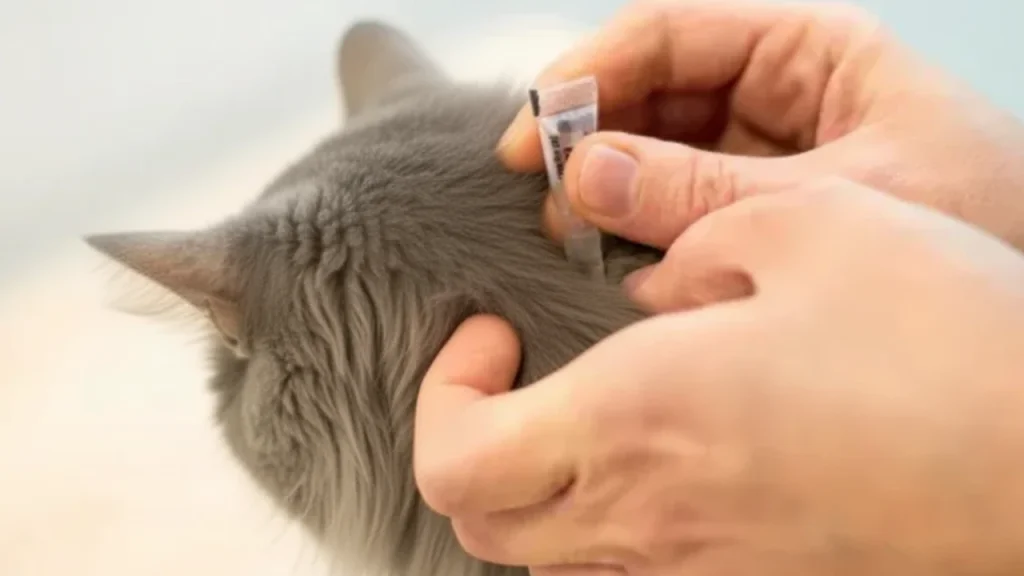Last Updated: 11/12/2025
How Often Should You Worm Your Cat
Regular deworming treatments are the key to ensuring your cat's health and safeguarding your family. Click to find out how often to worm your cat and more!
Author: Dr Katelyn Bailey BVSc (Hons)
Reading Time: 7 minutes - short read
As a cat owner, you want to ensure your furry friend is healthy and happy. One common concern is intestinal parasites, which can cause a variety of health issues in cats. You might be wondering, "How often should I worm my cat?"
Intestinal worms can cause serious health problems for your pet and even human family members. Left untreated, an infection with these parasites can lead to weight loss, diarrhoea, and in some cases severe signs like anaemia. Even worse, your cat might look perfectly healthy on the outside, making it easy to overlook the internal struggle against these parasites.
So, what's the best course of action? Regular deworming treatments are the key to ensuring your feline friend's health and safeguarding your family.
Why should you deworm your cat regularly?

Health implications for your cat
Once infected, cats can show any or all of the following signs:
- Weight loss
- Diarrhoea (sometimes with blood)
- Vomiting
- Weakness
- Pale gums
- Pot-bellied appearance
- Rougher, duller coat
- Stunted growth (if kitten)
Worms may also be visible in the stool or around the anus.
Cats with mild worm burdens may not show any physical symptoms, but remain infective and can develop signs over time.
In more severe cases, an intestinal worm burden can give rise to serious health issues for your cat. Diarrhoea and vomiting can both lead to dehydration and lack of nutrient absorption. If anaemia develops, this can cause a profound weakness and also puts added stress on the heart and lungs. If left untreated, severe intestinal worm infestations can even result in death- particularly in young kittens.
Preventing re-infection
Keeping your cat up to date with regular cat worming prevention at appropriate intervals is a vital component of breaking the parasitic life cycle and preventing re-infection. Regular deworming will kill and eliminate any worms your cat may ingest, therefore preventing eggs from being laid and stopping the life cycle in its tracks.
Regular treatment is essential to help keep your cat worm-free, as they will continually be at risk for reinfection due to their natural behaviours of roaming, grooming, and hunting.
Human safety
Some intestinal worms that infect cats, such as hookworm and roundworm, are zoonotic. This means they can also infect and cause disease in humans- especially young, elderly, pregnant or immunocompromised individuals. Possible consequences of human infection include migration of the larvae into organs such as the liver, skin, nervous system, or even the eyes, which can lead to irreversible organ damage.
While maintaining good hygiene with regular hand washing and frequent litter tray cleaning is important, regular intestinal deworming plays a crucial role in reducing the risk of zoonotic transmission.
What type of worms do you need to protect against?

Roundworms
These are the most common intestinal parasites in cats, and are long and round with an appearance resembling spaghetti. A single female adult roundworm can shed up to 200,000 eggs per day in the faeces of infected cats, and these eggs can survive in the environment for several years. Cats can become infected with roundworm in the following ways:
- Through ingesting worm eggs from the soil, or through normal grooming
- Consuming a prey animal, often a rodent, carrying worm larvae
- Nursing from an infected mother cat (a common route of transmission for kittens)
Hookworms
Hookworms inflict damage to the intestine where they attach and feed on the cat's blood. In extreme cases this blood-feeding parasite can cause fatal anaemia, particularly in young kittens. Transmission to cats can occur through various means:
- Ingestion of larvae from the environment
- Ingestion of prey animals containing infective larvae in their tissues
- Infection can also occur through larval penetration of the cat's skin
- Nursing from an infected mother cat
Tapeworms
Tapeworms are named for their flat ribbon-like bodies. Sometimes you may be unfortunate enough to notice moving worm segments in your cat's faeces or the fur around their bottom. Cats become infected with tapeworm when they ingest an intermediate host infested with these parasites. The type of intermediate host varies with the different tapeworm species.
For example:
- Dipylidium caninum (the flea tapeworm) infestation occurs when cats ingest an infected flea during grooming.
- Taenia taeniaeformis (the cat tapeworm) infestation occurs when cats prey on and consume rats, mice or hares infested with this parasite.
Recommended Worming Schedules

Adult cats
Roundworm and hookworm
The Australian Companion Animal Zoonoses Advisory Panel recommends monthly deworming (and year-round flea control) for adult cats, regardless of whether or not they have outdoor access. This approach helps lessen the zoonotic risk associated with these parasites. Many 'all in one' products are given monthly and will protect against these worms.
Tapeworm
Cats that spend time outdoors or who prey or scavenge on rodents are at an increased risk for tapeworm infection and therefore monthly tapeworm coverage is recommended. For low-risk adult cats, tapeworm prevention can be given every 3 months.
Kittens
Roundworm, hookworm and tapeworm
Kittens should be dewormed every 2 weeks from 2 to 12 weeks of age. If you have adopted a new kitten and are unsure when they were last dewormed, it's recommended to double check with the rescue or breeder you got them from, and give worming prevention immediately if they are not up to date or if they have an unknown parasite prevention history. After twelve weeks of age, kittens should be dewormed monthly as per the schedule for adult cats.
Pregnant and nursing cats
Roundworm, hookworm and tapeworm
While all forms of parasite prevention are important for cats during pregnancy and lactation, deworming is particularly vital due to the risk of transmission to the kittens. As a general rule, pregnant and lactating cats should be dewormed every 3 weeks during the pregnancy, and up until the kittens have been weaned.
It's important to ensure the product you use is safe for pregnancy and lactation, and to also check with your veterinarian as to whether they recommend any specific instructions for parasite prevention given your cat's lifestyle and risk of infection.
For more information on parasite prevention during pregnancy, take a look at our Pregnant Cat Guide.
What type of worming preventatives are available to cats?

Spot-ons
Spot-on parasite prevention for cats is by far the most convenient and popular option for cat owners. Cats can be notoriously difficult to tablet, and applying a topical spot-on to the skin on the back of the neck is overall a much simpler process.
To make things even more convenient, there are multiple 'all in one' spot-on products available that, along with intestinal worms, also cover other parasites of importance such as fleas, ticks and heartworm, making it easy to keep your kitty up to date with everything needed.
Always make sure to carefully check the packaging for what parasites are covered, and how often the product needs to be applied. Many spot-ons that cover intestinal worms will need to be reapplied monthly.
It's also important to be aware that most spot-on products, with the exception of Nexgard Spectra for Cats and Profender, do not cover tapeworm so separate coverage for tapeworm will be needed.
Our top recommendations for topical intestinal worming products for cats
Tablets
There are no 'all in one' oral preventatives available for cats, making them a much less convenient option when compared to spot-ons. That being said, there are multiple tablet options that prevent and treat tapeworm, which is not covered by the majority of spot-on products.
While a tapeworm-only tablet can be purchased from your veterinarian, many owners find it easier to give an allwormer tablet that covers tapeworm in combination with a regular all in one spot-on.
Again, always make sure to carefully check the packaging for what parasites are covered, and how often the product needs to be given.
Our top recommendations for oral intestinal worming products for cats
Is it necessary to deworm indoor cats?

Yes. Many assume that if their cat remains indoors, the risk of intestinal worm infection is low. However, indoor cats are still vulnerable to parasites through a few different avenues.
Worm eggs can be inadvertently carried indoors on shoes, clothing or other pets. Additionally, cats can acquire tapeworm indirectly via fleas carried inside by outdoor pets or through activities like hunting lizards or rodents. Roundworms and tapeworms can also be transmitted to cats through the consumption of undercooked or raw meat or consuming pests such as small rodents which may enter the home.
What about heartworm prevention in cats?
It's important to be aware that some 'allwormers' targeted at intestinal worms do not cover your cat for heartworm. Always make sure you read the label carefully to see what your preventative product covers and check out Heartworm Facts Every Pet Owner Should Know for more information.
Heartworm Preventatives for cats
There are a lot of products on the market these days, many covering different parasites, and finding the best combination for your cat can get confusing very quickly! If you have any questions about the right products for your cat, or want to ensure your current regime is covering them for everything they need, make sure to ask your veterinarian or head to our vet advice and services page.
Articles recommended for you
Our vet authored guide to the benefits of feeding your dog fresh food plus tips and advice for introducing it into their regular menu.
See our guide to protecting your pet from parasites from our vet team.
Thinking of getting a fish? Check out our guide for setting up a tank and home care tips!
Looking to understand horse feeds better? This comprehensive guide covers feeding recommendations for horses of all ages and disciplines.
Does your pet suffer from anxiety? Check out our Vet-guide for treatment options to help your pet.
History
Our experts continually monitor the health and wellness space and we update our articles when new information becomes available.
Tue Oct 11 2023
Written by Dr Katelyn Bailey BVSc (Hons)Dr Katelyn Bailey BVSc (Hons)
Veterinarian
Dr Katelyn Bailey graduated as a veterinarian from The University of Queensland in 2018 and has since worked in small animal general practice clinics in south-east Queensland. Her special interests include feline medicine and behaviour, preventative health care, internal medicine, research and senior pet care. Katelyn is a strong proponent of the human-animal bond and loves to hear about the quirks that make each pet so special.

